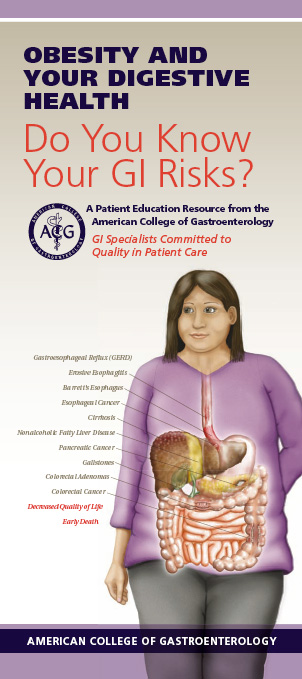Obesity and your gastrointestinal health
What is obesity and how is it measured?
Obesity is a term used to describe body weight that is significantly greater than what is considered healthy. If you are obese, you have a higher amount of body fat compared to lean muscle mass. Importantly, obesity is a diagnosis, not a judgment of character.
One of the simplest and most accepted ways to measure obesity involves calculation of the body mass index (BMI). BMI is a determination of body fat based on height and weight. Adults with a BMI of 25 to 29.9 are considered overweight while those with a BMI of 30 or more are considered obese. Obesity can be further classified as Class I, II or III depending upon the degree of increase in BMI over 30. Class III obesity is sometimes referred to as extreme obesity. Morbid obesity is when an obesity-associated complication (see below) exists in an individual with any class of obesity. BMI does have some limitations – it may overestimate body fat in those with a muscular build and it may underestimate body fat in those who have lost muscle mass.
What causes obesity?
Obesity occurs when you eat more calories than you use doing activities – your body stores the difference. A calorie is a unit of energy in food and drink. Your body needs energy to be healthy and active but if you take in more energy than your body uses, over time you will gain weight. Be aware that eating a diet consisting of low-fat or low-carbohydrate/sugar foods without accounting for the total number of calories consumed can result in weight gain! In addition to eating, activity level and exercise habits, a person’s weight is a result of many factors including the environment and culture in which they live, their family history and genetics, and how their body uses the energy consumed (metabolism).
Can obesity be prevented?
Maintaining a healthy weight requires a balance of the calories consumed from foods and beverages with the calories expended through physical activity and normal metabolism. Healthy foods can provide adequate nutrition and an appropriate number of calories and developing healthy eating habits can lead to healthier favorite dishes and reduced calorie-rich temptations.
To promote healthy eating habits:
- Eat plenty of vegetables, fruits, and whole-grain products.
- Include low-fat or non-fat milk or dairy products.
- Choose lean meats, poultry, fish, lentils, and beans for protein.
- Serve reasonably-sized portions.
- Drink lots of water.
- Limit fruit juice and sodas.
- Limit consumption of sugar and saturated fat.
Remember that small changes every day can lead to significant benefit over time. In addition to healthy eating, an active lifestyle will help maintain your weight. Choosing to add more physical activity to your day will increase the amount of calories your body burns. This makes it more likely that you’ll maintain your weight.
IMPORTANT REMINDER
The preceding information is intended only to provide general information and not as a definitive basis for diagnosis or treatment in any particular case. It is very important that you consult your doctor about your specific condition.

